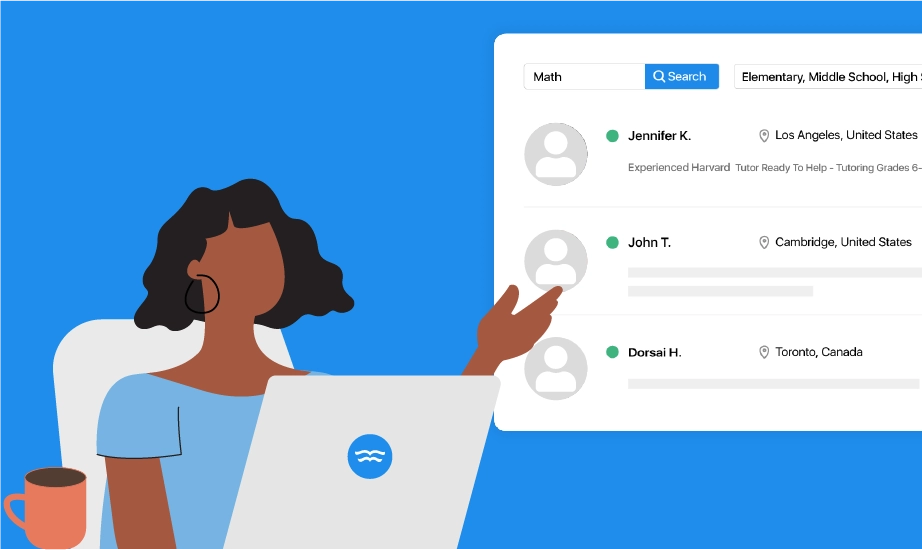
Parents ask this question every week. Some ask after report cards drop. Others ask before standardized exams. The answer varies, but it always matters.
Here is a fact that surprises most families: hourly rates for private educators can range from $25 to $250 across the US. The difference often reflects location, subject, qualifications, and experience. That gap can feel overwhelming. Families want to support their children, but no one wants to make a blind investment.
This guide helps families gain clarity. It unpacks hourly rates, pinpoints cost drivers, and outlines what to expect in different regions. The goal is not to find the cheapest option. The goal is to find the right fit.
What Is the Average Hourly Rate for Tutors in the US?

The national average sits between $45 and $80 per hour. That figure covers academic support for K–12 students in common subjects like math, reading, and writing.
Top-tier experts, college prep specialists, and niche educators often charge far more. Entry-level providers or college students may offer rates as low as $20 to $30.
For a more detailed breakdown:
- Elementary level: $40 to $60 per hour for basic reading and math support, often delivered by credentialed teachers or skilled college graduates.
- Middle school: $50 to $70 per hour with a focus on pre-algebra, science, and foundational writing skills.
- High school (standard subjects): $60 to $90 per hour with more focus on grade recovery or standardized curriculum alignment.
- SAT/ACT or test prep: $75 to $150 per hour with structured curriculum, mock tests, and specialized tracking tools.
- Special education or neurodivergent support: $70 to $125 per hour with tailored approaches and certified specialists.
- Private college consultants: $120 to $250 per hour, often including application guidance, essay review, and admissions planning.
Some families pay by the session, others by the hour. Ask for rate structure details upfront. Most professionals will quote clear terms.
Where to Find Trusted Professionals Without Overpaying

A strong professional doesn’t always charge the highest rate. Smart families compare value, not just price.
The platform Find A Super Tutor offers access to pre-vetted professionals in education and childcare. It lets parents view individual profiles, experience levels, and pricing. Options range from short-term help to long-term roles like governesses and au pairs.
With flexible plans, parents can customize services around school breaks, exam windows, or ongoing support. Many families use platforms like this to match their children with experts who bring both skill and personality.
Regional Price Differences That Affect Hourly Rates
Hourly rates change based on geography. What families pay in New York often looks very different from what families pay in St. Louis or Houston. The chart below gives a snapshot of how much average hourly rates vary across major metro areas in the US.
Each bar represents the midpoint between the typical low and high range in that city. These figures reflect in-person sessions with qualified educators. They don’t always include extra fees or seasonal fluctuations, but they offer a solid benchmark for families planning budgets.
Rates stay highest in coastal cities like New York, San Francisco, and Los Angeles. Cities like Chicago, Seattle, and Miami land in the middle. Midwest and Southern cities such as Houston and St. Louis remain more affordable.
For rural areas, online sessions often offer better access and fairer rates compared to limited local options.
Use the chart as a starting point, not a guarantee. Prices still depend on subject, provider experience, and session format. But this gives a reliable overview for families comparing options by location.
What Factors Change the Hourly Price?

Several key factors push rates up or down. It’s not just about the subject. It’s about how the service is delivered and who delivers it.
Subject complexity plays a major role. Basic support in elementary subjects will cost less than advanced calculus or college essay coaching. Language instruction or coding also brings a different rate structure.
Experience and credentials also raise rates. A licensed teacher with years of classroom experience will charge more than a peer mentor or college junior. Graduate-level educators often command premium fees due to specialization.
Delivery format makes a difference. Online sessions tend to be more affordable than in-person meetings. Group formats reduce the per-hour cost. One-on-one work remains the gold standard for customization.
Finally, long-term clients may access better deals. Those who schedule weekly support often pay less per hour than families booking single sessions.
How to Choose the Right Rate for Your Family
Every family brings unique goals to the table. Some want academic recovery. Others need enrichment. Some seek emotional support during high-stress years. The right rate depends on the value received.
Start with purpose. Clarify the reason for hiring support. Then look for individuals who specialize in that outcome. Ask about style, communication, and availability.
Don’t rush to the most expensive option. And don’t settle for low-cost support without checking qualifications.
When to Pay More for Private Educators

There are moments when higher rates make sense. The stakes are higher. The support needs to be targeted and proven.
Families should prepare to invest more:
- If a child has a diagnosed learning difference that requires specialized interventions and progress tracking.
- If high-level test prep is involved, especially for SAT, ACT, or college admissions interviews.
- If the educator holds formal teaching credentials, master’s degrees, or content-specific certifications.
- If ongoing assessment reports and custom learning plans are included in the support.
These cases usually call for educators who bring more than content. They bring strategy, structure, and measurable growth.
How to Save Without Compromising Quality
Families often ask how to protect the budget without sacrificing results. The good news: smart planning goes a long way.
Try these approaches:
- Ask about package discounts or referral incentives. Some providers lower rates for upfront commitments or when clients refer others.
- Look into group options. Families with siblings close in grade level may benefit from paired sessions. Friends can also share.
- Consider early-career professionals. Passionate college graduates or grad students can offer great support, especially when paired with oversight.
- Use platforms that compare multiple providers. This adds transparency and control over what you pay.
- Consider virtual sessions. Many professionals offer lower rates for online support, and the quality can be excellent.
Price should never be the only factor. But with clear questions and careful comparison, families can stretch their investment without compromising progress.
Red Flags That Signal Poor Value
No family wants to waste time or money. Trust your instincts. A few signs often point to trouble.
Avoid professionals who hide their pricing or refuse to provide a clear rate sheet. Be cautious with anyone who doesn’t offer a structured approach or cannot explain how they track progress. Poor communication upfront often leads to frustration later.
Inflexible scheduling or a pattern of last-minute cancellations creates chaos. A provider’s reliability should match their resume.
Professionals should always answer questions directly. They should never rush you into a decision. If anything feels vague, that’s a sign to look elsewhere.
Questions to Ask Before Hiring
Many families feel unsure about what to ask. The right questions can prevent disappointment.
Start with purpose: what outcomes does your family need? Then ask practical, results-focused questions:
- How do you tailor support to different learners, especially those with focus or confidence challenges?
- What results have your students seen in the past year? Are there measurable gains?
- What is your cancellation and rescheduling policy? Is there flexibility built in?
- Are learning materials and prep time included in your hourly rate?
- How often do you share updates with families? Do you offer written reports?
- Can I speak to a current or past client who had a similar situation?
Don’t just listen to answers. Pay attention to tone, professionalism, and responsiveness. A well-prepared professional always stands out.
Final Thoughts

Rates vary for a reason. Quality, location, and subject matter all play a role. That doesn’t mean families need to feel lost or pressured.
Every decision should reflect a child’s unique needs. A calm, structured process builds trust and long-term progress.
Aim for clarity over perfection. Ask questions. Compare fairly. Stay focused on the child, not just the invoice.
Families deserve more than vague estimates. They deserve transparent support, honest guidance, and professionals who deliver real value.
A good match is worth the cost. Always.














